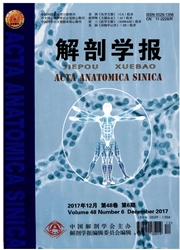

 中文摘要:
中文摘要:
目的研究人间充质干细胞(MSCs)移植对四氯化碳诱导性肝硬化大鼠肝纤维化的影响.方法 实验动物随机分为对照组和肝硬化组,肝硬化组采用60%的四氯化碳植物油皮下注射7周制成肝硬化大鼠模型,再随机分成肝硬化7周组、MSC对照组和MSC移植组.在MSC移植组,人胚胎脐带血源的MSCs鉴定后,经肠系膜上静脉注射移植入大鼠体内,3周后处死所有大鼠,行肝组织冰冻切片,抗人表皮生长因子受体(EGF-R)的免疫组织化学显色和天狼猩红染色. 结果肝硬化7周组、MSC对照组和MSC移植组大鼠的血清碱性磷酸酶白蛋白(ALP)、(ALB)和胆固醇(CHO)含量出现了不同程度的异常.肝硬化7周组大鼠肝组织中有大量的胶原纤维增生并形成假小叶;MSC对白蛋白照组与肝硬化7周组相似;仅在MSC移植组的大鼠肝中观察到散在的棕黄色的抗人EGF-R阳性细胞,肝组织中胶原纤维的量明显小于MSC对照组.结论经肠系膜上静脉移植人MSC,可明显改善四氯化碳诱导性肝硬化大鼠的肝纤维化程度,为肝硬化的治疗提供实验依据.
 英文摘要:
英文摘要:
Objective To study the effect of transplanted with human mesenchymal stem cells (MSCs) on the rat fiver fibrosis in carbon tetrachloride (CCl4)-induced hepatocirrhosis rats. Methods Wistar rats were divided into control ( n = 8) and hepatocirrhosis groups, and 24 hepatocirrhosis rats were made by subcutaneous injection with 60% CCl4-peanut oil for 7 weeks, named 7-week hepatocirrhosis group (n = 8). Other 7 weeks hepatocirrhosis rats were subdivided into MSC control group (n = 8) and MSC transplanted group ( n = 8). After identification to MSCs with FACS calibur flow cytometry, MSCs were injected into the superior mesenteric vein for 3 weeks in MSC transplanted group. All of rats were killed at the beginning of 11-week. The clinical blood biochemical parameters from the inferior vena cava were examined. The survival of human MSCs in liver was observed by immunohistochemistry reaction of anti-hEGF-R. The degree of liver cirrhosis was evaluated by stains of Sirius red. Results Plasma ALP, ALB and CHO were abnormal to varying degree in 7-week hepatocirrhosis, MSC control and MSC transplanted groups. In 7 weeks hepatocirrhosis rats, a large amount of hyperplastic collagenous fiber was presented in liver tissue and the frame of the pseudolobuli was formed. These were similar to MSC control group. Only in MSC transplanted group, a few human EGF-R ( + ) cells were observed in livers. The amount of hyperplastic collagenous fiber in MSC transplanted group was significantly lower than those of the 7-week hepatocirrhosis and MSC control gruops. Conclusion Liver fibrosis could be improved obviously in hepatocirrhosis rats transplanted with human MSCs. These experimental results could probably provide an experimental evidence of treatment of liver cirrhosis.
 同期刊论文项目
同期刊论文项目
 同项目期刊论文
同项目期刊论文
 期刊信息
期刊信息
